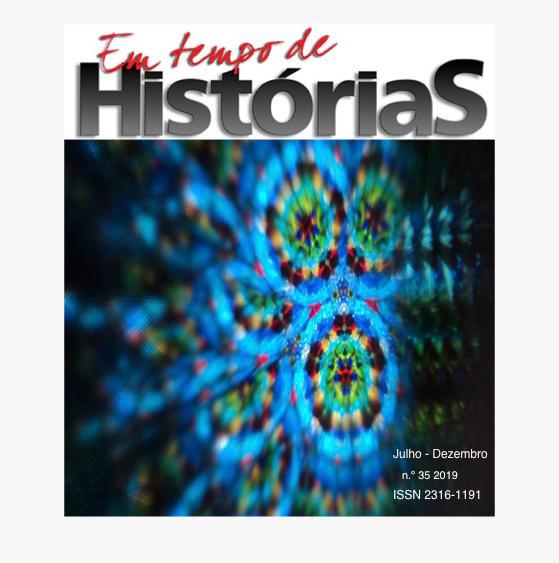Inglaterra, uma nova Israel
Usos do Deuteronômio, espaço imaginário e legitimação no discurso cronístico a Batalha de Agincourt ”“ século XV
DOI:
https://doi.org/10.26512/emtempos.vi35.28651Keywords:
Battle of Agincourt. Deuteronomy. Medieval England.Abstract
The book of Deuteronomy undoubtedly occupies an important space amongst the books of the Pentateuch, and which greatly influenced the political speech during the Middle Ages. It is in it that the ideas of Israel and its people as chosen by God and promised land to appear more clearly. This paper seeks to analyse the elements of Deuteronomy which appear in chronicles of the 15th century, especially the ones related to Lancastrian kings, and how a speech over the Battle of Agincourt within The Hundred Years War produced an idea of realm and identity based on the discourses of the Old Testament. The Middle Ages formulated imaginary spaces, and therefore England and its kings are represented as a new Israel, as well as their kings. The monarchs especially are seen as chosen of God, guide of the people towards glory and victories. Which guarantees a materiality of aspects present in Christian imaginary, taken to the chronicles. More than a representation, England is a new Israel and its people the chosen ones.
References
ANÔNIMO. An English chronicle of the reigns of Richard II, Henry IV, Henry V and Henry VI. Written before the Year of 1471. Editado por Rev. John Silvester Davies: Camden Society, 1856.
Bíblia de Jerusalém. Tradução das introduções e notas de La Bible de Jérusalem, edição de 1998, publicada sob a direção da “École biblique de Jérusalem”. São Paulo: Paulus, 8º impressão de 2012.
CAPGRAVE, John. The Book of Illustrious Henries. Editado e traduzido do latim por Rev. Francis Charles Hingeston. Londres: Longman, Brown, Green, Longmans and Roberts, 1858.
CAPGRAVE, John. The Chronicle of England. Editado por Rev. Francis Charles Hingeston. The chronicles and memorials of Great Britain and Ireland during The Middle Ages.Londres: Longman, Brown, Green, Longmans and Roberts, 1858.
LEVENSON, Jon D. Deuteronomy: Introduction. In: BERLIN, Adele; BRETTLER, Marc Zvi; FISHBANE, Michael. (Orgs.) The Jewish Study Bible, featuring The Jewish Publication Society. TANAKH translation. New York: Oxford University Press: 2004.
USK, Adam. Chronicon Adae de Usk. A.D. 1377-1421. Editado por Sir Edward Maunde Thompson. Royal Society of Literature. Londres: Oxford University Press, 1904.
WALSINGHAM, Thomas. The Chronica Maiora (1376-1422). Editado por James G. Clark. Traduzido por David Priest. Woodbridge: The Boydell Press, 2005.
Referências Bibliográficas.
ALLMAND, Christopher. Henry V. Los Angeles: University of California Press, 1992.
ALLMAND, Christopher. Society at war: the experience of England and France during the Hundred Years War. Edinburgo: Oliver & Boyd, 1973.
CARRUTHERS, Mary. The Book of Memory: A study of memory in Medieval Culture. Cambridge: Cambridge University Press, 2008.
CURRY, Anne. The Hundred Years War ”“ 1337-1453. Oxford: Osprey Publishing, 2002.
GENET, Jean-Philippe. La genèse d’État moderne. Culture et société politique en Angleterre. Edição ebook. PUF : Paris, 2015.
INNES, Matthew. Introduction: using the past, interpreting the present, influencing the future. In: HEN, Yitzhak; INNES, Matthew. (Orgs). Using the past in the early middle ages. Cambridge: Cambridge University Press, 2004.
LE GOFF, Jacques. A política será ainda a Ossatura da História? In: LE GOFF, Jacques. O maravilhoso e o quotidiano no ocidente medieval. Lisboa: Edições 70, 2010.
MCKENNA, John W. How God Became an Englishman. In: GUTH, DeLloyd J. & MCKEENA, John W.(Orgs.) Tudor Rule and Revolution: Essays for Grelton from his Americans friends. Cambridge: Cambridge University Press, 1982.
PEARSALL, Derek. “Crowned King”: war and peace in 1415. In: STRATFORD, Jenny (Org.) The Lancastrian Court. Lincolnshire: Harlaxton Medieval Studies, 2001. (Volume XIII).
Downloads
Published
Issue
Section
License
Autores que publicam nesta revista concordam com os seguintes termos:
- Autores mantém os direitos autorais e concedem à revista o direito de primeira publicação, sendo o trabalho simultaneamente licenciado sob a Creative Commons Attribution License , licença que permite que outros remixem, adaptem e criem a partir do seu trabalho para fins não comerciais, e embora os novos trabalhos tenham de lhe atribuir o devido crédito e não possam ser usados para fins comerciais, os usuários não têm de licenciar esses trabalhos derivados sob os mesmos termos.
- Autores têm autorização para assumir contratos adicionais separadamente, para distribuição não-exclusiva da versão do trabalho publicada nesta revista (ex.: publicar em repositório institucional ou como capítulo de livro), com reconhecimento de autoria e publicação inicial nesta revista.
- Autores têm permissão e são estimulados a publicar e distribuir seu trabalho online (ex.: em repositórios institucionais ou na sua página pessoal) a qualquer ponto antes ou durante o processo editorial, já que isso pode gerar alterações produtivas, bem como aumentar o impacto e a citação do trabalho publicado (Veja O Efeito do Acesso Livre).













